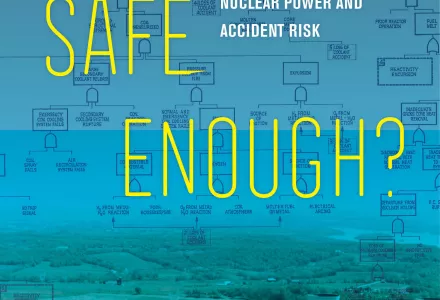Safe Enough? A History of Nuclear Power and Accident Risk
A Project on Managing the Atom (MTA) seminar with Thomas Wellock, historian at the U.S. Nuclear Regulatory Commission (NRC).
Please RSVP to receive the Zoom link.
A Project on Managing the Atom (MTA) seminar with Thomas Wellock, historian at the U.S. Nuclear Regulatory Commission (NRC).
Please RSVP to receive the Zoom link.

Since the dawn of the Atomic Age, nuclear experts have labored to imagine the unimaginable and prevent it. They confronted a deceptively simple question: When is a reactor “safe enough” to adequately protect the public from catastrophe? Some experts sought a deceptively simple answer: an estimate that the odds of a major accident were, literally, a million to one. Far from simple, this search to quantify accident risk proved to be a tremendously complex and controversial endeavor, one that altered the very notion of safety in nuclear power and beyond.
Safe Enough? is the first history to trace these contentious efforts, following the Atomic Energy Commission and the Nuclear Regulatory Commission as their experts experimented with tools to quantify accident risk for use in regulation and to persuade the public of nuclear power’s safety. The intense conflict over the value of risk assessment offers a window on the history of the nuclear safety debate and the beliefs of its advocates and opponents. Across seven decades and the accidents at Three Mile Island, Chernobyl, and Fukushima, the quantification of risk has transformed both society’s understanding of the hazards posed by complex technologies and what it takes to make them safe enough.
Thomas Wellock is the historian at the U.S. Nuclear Regulatory Commission (NRC). He is the author of Safe Enough? A History of Nuclear Power and Accident Risk (March 2021) published by the University of California Press. He has published two other books, Critical Masses: Opposition to Nuclear Power in California, 1958-1978 and Conserving the Nation: The Conservation and Environmental Movements, 1870-2000, as well as numerous articles on the history of nuclear power and environmentalism.
Prior to joining the NRC, he was a professor of U.S. history at Central Washington University, and earned his Ph.D. from the University of California, Berkeley. He also worked as a reactor test engineer at the Electric Boat Shipyard in Groton, CT and a systems engineer at the Davis-Besse nuclear power station near Toledo, OH.